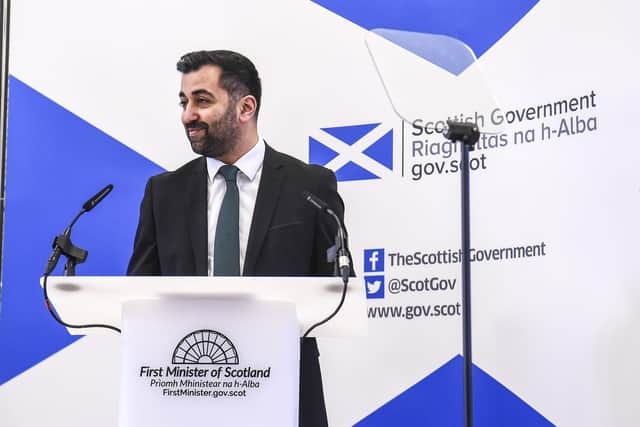Humza Yousaf on why he welcomes scrutiny and challenge of his Scottish independence plans
For far too many people, the UK economy has stopped working.
It is characterised by low growth, high inequality and poor productivity, which is the key driver of living standards. Although many people are still doing well in Scotland, continuing down this path of low growth and high inequality is no basis for a good society.
Advertisement
Hide AdAdvertisement
Hide AdI know that it is easy to describe the problem. The more challenging issue is what to do about it.


One thing I am certain of, however, is that leaving the EU, against of course the wishes of the people of Scotland, was never the answer to a poorly performing UK economy. Indeed independent estimates say Brexit has already wiped billions of pounds from the UK and Scottish economies, compared with continuing EU membership.
There is zero appetite from Labour and the Tories to either reverse Brexit or even to join the huge European single market, which by population is seven times the size of the UK. So the Westminster parties, for all their talk about growth, will continue to apply the Brexit brake.
As First Minister of a government elected on a platform to pursue independence, it might make political sense to stand back, watch the continuing decline and indulge in a kind of “I told you so” politics.
But that would be the wrong. It would mean condemning too many people to a future of low living standards and stifled ambition and that is something I am just not prepared to do.
In government, by using the limited powers of devolution we’re directing vital support to help with the cost of living, not least to low income families with children, and we’re continuing to help business with a rates relief package worth nearly £700 million.
And this week I delivered the first in a series of speeches to promote an inclusive debate on whether there is a better way forward than a poorly performing Brexit-based economy, a future instead where decisions about Scotland are taken here in Scotland.
The plan we are setting out has, at its heart, the idea of building consensus. That’s not just the way I like to do politics, it’s the smart thing to do for the economy.
Advertisement
Hide AdAdvertisement
Hide AdSo in my speech this week I set out a proposals for an industrial policy council in an independent Scotland, which would involve business, academia and unions and draw in expertise from beyond Scotland’s borders. The plan involves Scotland joining the European Union as a member state in our own right for the very first time.
The EU and US are both implementing highly ambitious industrial strategies accompanied by huge levels of investment. Meanwhile Westminster is obsessed with slogans such as “stop the boats” and which party can cut migration the most.,
In the coming months we’ll continue to set out a better alternative with proposals on how the labour market should work in an independent Scotland, on how we can encourage greater investment, a competitive business environment and better corporate governance.
I welcome scrutiny and challenge on those plans – indeed I hope to encourage widespread deliberative engagement to bring about the best possible outcome. But from some quarters this week there was a very different response – a desperation almost to shut down any sense of the possibilities that the powers of independence can offer.
That maybe because the sheer scale of UK economic underperformance and the knock-on impact on living standards is becoming clear – and that the case for something better is becoming much stronger.
In a recent report, a leading think-tank said if the UK had the average income and inequality of similar countries, then the typical household would be £8,300 better off.
Using the same methodology, Scottish Government analysis shows that a comparison with countries similar to Scotland like Denmark, Ireland and Norway, leads to an even higher figure – matching their performance would mean the typical household here would be £10,200 better off.
No-one is saying an independent Scotland could achieve that overnight. Whether we succeed or not will be down to our efforts and decisions as a country, but the success of those nations surely demonstrates the prize of independence if we get things right, if we become more normal and more like those comparable nations in terms of economic performance.
Advertisement
Hide AdAdvertisement
Hide AdUltimately it should be for the people of Scotland to decide their future. And we will continue to give them the information they need, as we were elected to do, to make an informed choice. Given that Westminster clearly isn’t working for Scotland, that task is now both essential and urgent.
Comments
Want to join the conversation? Please or to comment on this article.